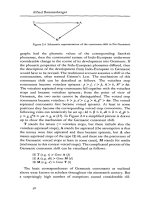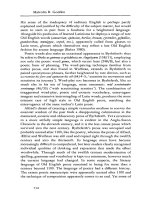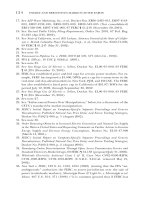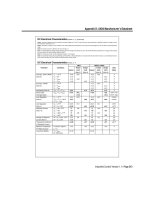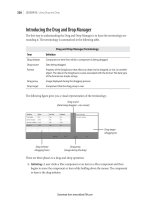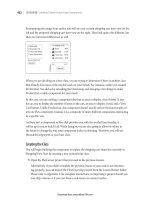the bastiat collection volume 1 phần 10 pdf
Bạn đang xem bản rút gọn của tài liệu. Xem và tải ngay bản đầy đủ của tài liệu tại đây (323.07 KB, 47 trang )
JACQUES BONHOMME: If butter is dear, it is not because
you pay high wages to the workmen, it is not even because you
make exorbitant profits; it is solely because Paris is ill-adapted for
that branch of industry; it is because you have wished to make in
the town what should be made in the country, and in the country
what should be made in the town. The people have not more
employment—only they have employment of a different kind.
They have no higher wages; while they can no longer buy com-
modities as cheaply as formerly.
THE PEOPLE: Hurrah for Cheapness!
PETER: This man seduces you with fine words. Let us place
the question before you in all its simplicity. Is it, or is it not true,
that if we admit firewood, meat, and butter freely or at a lower
duty, our markets will be inundated? Believe me there is no other
means of preserving ourselves from this new species of invasion
but to keep the door shut, and to maintain the prices of commod-
ities by rendering them artificially scarce.
A VERY FEW VOICES IN THE CROWD: Hurrah for
Scarcity!
JACQUES BONHOMME: Let us bring the question to the
simple test of truth. You cannot divide among the people of Paris
commodities that are not in Paris. If there be less meat, less fire-
wood, less butter, the share falling to each will be smaller. Now
there must be less if we prohibit what should be allowed to enter
the city. Parisians, abundance for each of you can be secured only
by general abundance.
THE PEOPLE: Hurrah for Abundance!
PETER: It is in vain that this man tries to persuade you that
it is your interest to be subjected to unbridled competition.
THE PEOPLE: Down with Competition!
JACQUES BONHOMME: It is in vain that this man tries to
make you fall in love with restriction.
THE PEOPLE: Down with Restriction!
PETER: I declare, for my own part, if you deprive the poor
ranchers and pig-drivers of their daily bread, if you sacrifice them
to theories, I can no longer be answerable for public order.
Economic Sophisms—Second Series 397
Social Fallacies 2 Chap Eleven.qxd 7/6/2007 11:00 AM Page 397
Workmen, distrust that man. He is the agent of perfidious Nor-
mandy, and is prompted by the foreigner. He is a traitor, and
ought to be hanged!
(The people preserve silence.)
JACQUES BONHOMME: Parisians, what I have told you
today, I told you twenty years ago, when Peter set himself to work
the town dues for his own profit and to your detriment. I am not,
then, an agent of Normandy. Hang me, if you will, but that will
not make oppression anything else than oppression. Friends, it is
neither Jacques nor Peter that you must kill, but liberty if you fear
it, or restriction if it does you harm.
THE PEOPLE: Hang nobody, and set everybody free.
398 The Bastiat Collection
Social Fallacies 2 Chap Eleven.qxd 7/6/2007 11:00 AM Page 398
12
SOMETHING ELSE
hat is restriction?”
“It is partial prohibition.” “What is prohibition?” “Absolute
restriction.”
“So that what holds true of the one, holds true of the other?”
“Yes; the difference is only one of degree. There is between
them the same relation as there is between a circle and the arc of
a circle.”
“Then, if prohibition is bad, restriction cannot be good?”
“No more than the arc can be correct if the circle is irregu-
lar.”
“What is the name which is common to restriction and pro-
hibition?”
“Protection.”
“What is the definitive effect of protection?”
“To exact from men a greater amount of labor for the same
result.”
“Why are men attached to the system of protection?”
399
“
W
Social Fallacies 2 Chap Twelve.qxd 7/6/2007 11:00 AM Page 399
“Because as liberty enables us to obtain the same result with
less labor, this apparent diminution of employment frightens
them.”
“Why do you say apparent?”
“Because all labor saved can be applied to something else.”
“To what?”
“That I cannot specify, nor is there any need to specify it.”
“Why?”
“Because if the amount of satisfactions the country at present
enjoys could be obtained with one-tenth less labor, no one can
enumerate the new enjoyments that men would desire to obtain
from the labor left disposable. One man would desire to be bet-
ter clothed, another better fed, another better educated, another
better amused.”
“Explain to me the mechanism and the effects of protection.”
“That is not an easy matter. Before entering on consideration
of the more complicated cases, we must study it in a very simple
one.”
“Take as simple a case as you choose.”
“You remember how Robinson Crusoe managed to make a
plank when he had no saw.”
“Yes; he felled a tree, and then, cutting the trunk right and left
with his hatchet, he reduced it to the thickness of a board.”
“And that cost him much labor?”
“Fifteen whole days’ work.”
“And what did he live on during that time?”
“He had provisions.”
“What happened to the hatchet?”
“It was blunted by the work.”
“Yes; but you perhaps do not know this: that at the moment
when Robinson was beginning the work he perceived a plank
thrown by the tide upon the seashore.”
“Happy accident! He of course ran to appropriate it?”
“That was his first impulse; but he stopped short, and began
to reason thus with himself: If I get this plank, it will cost me only
400 The Bastiat Collection
Social Fallacies 2 Chap Twelve.qxd 7/6/2007 11:00 AM Page 400
the trouble of carrying it, and the time needed to descend and
remount the cliff.”
“But if I form a plank with my hatchet, first of all, it will pro-
cure me fifteen days’ employment; then my hatchet will get blunt,
which will furnish me with the additional employment of sharp-
ening it; then I shall consume my stock of provisions, which will
be a third source of employment in replacing them. Now, labor is
wealth. It is clear that I should ruin myself by getting the plank. I
must protect my personal labor; and, now that I think of it, I can
even increase that labor by throwing back the plank into the sea.”
“But this reasoning was absurd.”
“No doubt. It is nevertheless the reasoning of every nation
that protects itself by prohibition. It throws back the plank that is
offered in exchange for a small amount of labor in order to exert
a greater amount of labor. Even in the labor of the Customhouse
officials it discovers a gain. That gain is represented by the pains
Robinson takes to render back to the waves the gift they had
offered him. Consider the nation as a collective being, and you
will not find between its reasoning and that of Robinson an atom
of difference.”
“Did Robinson not see that he could devote the time saved to
something else?”
“What else?”
“As long as a man has wants to satisfy and time at his disposal,
there is always something to be done. I am not bound to specify
the kind of labor he would in such a case undertake.”
“I see clearly what labor he could have escaped.”
“And I maintain that Robinson, with incredible blindness,
confounded the labor with its result, the end with the means, and
I am going to prove to you. . . .”
“There is no need. Here we have the system of restriction or
prohibition in its simplest form. If it appears to you absurd when
so put, it is because the two capacities of producer and consumer
are in this case mixed up in the same individual.”
“Let us pass on, therefore, to a more complicated example.”
Economic Sophisms—Second Series 401
Social Fallacies 2 Chap Twelve.qxd 7/6/2007 11:00 AM Page 401
402 The Bastiat Collection
“With all my heart. Some time afterwards, Robinson having
met with Friday, they united their labor in a common work. In the
morning they hunted for six hours, and brought home four bas-
kets of game. In the evening they worked in the garden for six
hours, and obtained four baskets of vegetables.
“One day a canoe touched at the island. A good-looking for-
eigner landed, and was admitted to the table of our two recluses.
He tasted and commended very much the produce of the garden,
and before taking leave of his entertainers, spoke as follows:
“ ‘Generous islanders, I inhabit a country where game is much
more plentiful than here, but where horticulture is quite
unknown. It would be an easy matter to bring you every evening
four baskets of game, if you will give me in exchange two baskets
of vegetables.’ ”
“At these words Robinson and Friday retired to consult, and
the debate that took place is too interesting not to be reported in
extenso.
“FRIDAY: What do you think of it?
“ROBINSON: If we accept the proposal, we are ruined.
“F.: Are you sure of that? Let us consider.
“R.: The case is clear. Crushed by competition, our hunting as
a branch of industry is annihilated.
“F.: What matters it, if we have the game?
“R.: Theory! It will no longer be the product of our labor.
“F.: I beg your pardon, sir; for in order to have game we must
part with vegetables.
“R.: Then, what shall we gain?
“F.: The four baskets of game cost us six hours’ work. The
foreigner gives us them in exchange for two baskets of vegetables,
which cost us only three hours’ work. This places three hours at
our disposal.
“R.: Say, rather, which are subtracted from our exertions.
There is our loss. Labor is wealth, and if we lose a fourth part of
our time we shall be less rich by a fourth.
“F.: You are greatly mistaken, my good friend. We shall have
as much game, and the same quantity of vegetables, and three
Social Fallacies 2 Chap Twelve.qxd 7/6/2007 11:00 AM Page 402
hours at our disposal into the bargain. This is progress, or there
is no such thing in the world.
“R.: You lose yourself in generalities! What should we make
of these three hours?
“F.: We would do something else.
“R.: Ah! I understand you. You cannot come to particulars.
Something else, something else—that is easily said.
“F.: We can fish, we can ornament our cottage, we can read
the Bible.
“R.: Utopia! Is there any certainty that we should do either
the one or the other?
“F.: Very well, if we have no wants to satisfy we can rest. Is
repose nothing?
“R.: But while we repose we may die of hunger.
“F.: My dear friend, you have got into a vicious circle. I speak
of a repose which will subtract nothing from our supply of game
and vegetables. You always forget that by means of our foreign
trade nine hours’ labor will give us the same quantity of provi-
sions that we obtain at present with twelve.
“R.: It is very evident, Friday, that you have not been edu-
cated in Europe, and that you have never read the Moniteur
Industriel. If you had, it would have taught you this: that all time
saved is sheer loss. The important thing is not to eat or consume,
but to work. All that we consume, if it is not the direct produce
of our labor, goes for nothing. Do you want to know whether you
are rich? Never consider the enjoyments you obtain, but the labor
you undergo. This is what the Moniteur Industriel would teach
you. For myself, who have no pretensions to be a theorist, the
only thing I look at is the loss of our hunting.
“F.: What a strange turning upside down of ideas! But . . .
“R.: No buts. Moreover, there are political reasons for reject-
ing the interested offers of the perfidious foreigner.
“F.: Political reasons!
“R.: Yes, he only makes us these offers because they are
advantageous to him.
Economic Sophisms—Second Series 403
Social Fallacies 2 Chap Twelve.qxd 7/6/2007 11:00 AM Page 403
“F.: So much the better, since they are for our advantage like-
wise.
“R.: Then by this traffic we should place ourselves in a situa-
tion of dependence upon him.
“F.: And he would place himself in dependence on us. We
should have need of his game, and he of our vegetables, and we
should live on terms of friendship.
“R.: System! Do you want me to shut your mouth?
“F.: We shall see about that. I have as yet heard no good rea-
son.
“R.: Suppose the foreigner learns to cultivate a garden, and
that his island should prove more fertile than ours. Do you see the
consequence?
“F.: Yes; our relations with the foreigner would cease. He
would take from us no more vegetables, since he could have them
at home with less labor. He would bring us no more game, since
we should have nothing to give him in exchange, and we should
then be in precisely the situation that you wish us in now.
“R.: Improvident savage! You don’t see that after having anni-
hilated our hunting by inundating us with game, he would anni-
hilate our gardening by inundating us with vegetables.
“F.: But this would only last so long as we were in a situation
to give him something else; that is to say, so long as we found
something else that we could produce with economy of labor for
ourselves.
“R.: Something else, something else! You always come back to
that. You are at sea, my good friend Friday; there is nothing prac-
tical in your views.
“The debate was long prolonged, and, as often happens, each
remained wedded to his own opinion. But Robinson possessing a
great influence over Friday, his opinion prevailed, and when the
foreigner arrived to demand a reply, Robinson said to him:
“ ‘Stranger, in order to induce us to accept your proposal, we
must be assured of two things:
404 The Bastiat Collection
Social Fallacies 2 Chap Twelve.qxd 7/6/2007 11:00 AM Page 404
“ ‘The first is, that your island is no better stocked with game
than ours, for we want to fight only with equal weapons.
“‘The second is that you will lose by the bargain. For, as in
every exchange there is necessarily a gaining and a losing party,
we should be dupes, if you were not the loser. What have you got
to say?’”
“ ‘Nothing,’ replied the foreigner; and, bursting out laughing,
he got back into his canoe.”
“The story would not be amiss if Robinson were not made to
argue so very absurdly.”
“He does not argue more absurdly than the committee of the
Rue Hauteville.”
“Oh! the case is very different. Sometimes you suppose one
man, and sometimes (which comes to the same thing) two men
living in company. That does not tally with the actual state of
things. The division of labor and the intervention of merchants
and money change the state of the question very much.”
“That may complicate transactions, but does not change their
nature.”
“What! you want to compare modern commerce with a sys-
tem of barter.”
“Trade is nothing but a multiplicity of barters. Barter is in its
own nature identical with commerce, just as labor on a small scale
is identical with labor on a great scale, or as the law of gravitation
that moves an atom is identical with the same law of gravitation
that moves a world.”
“So, according to you, these arguments, which are so unten-
able in the mouth of Robinson, are equally untenable when urged
by our protectionists.”
“Yes; only the error is better concealed under a complication
of circumstances.”
“Then, pray, let us have an example taken from the present
order of things.”
Economic Sophisms—Second Series 405
Social Fallacies 2 Chap Twelve.qxd 7/6/2007 11:00 AM Page 405
“With pleasure. In France, owing to the exigencies of climate
and habits, cloth is a useful thing. Is the essential thing to make it,
or to get it?”
“A very sensible question, truly! In order to have it, you must
make it.”
“Not necessarily. To have it, someone must make it, that is
certain; but it is not at all necessary that the same person or the
same country that consumes it should also produce it. You have
not made that stuff which clothes you so well. France does not
produce the coffee on which our citizens breakfast.”
“But I buy my cloth, and France her coffee.
“Exactly so; and with what?”
“With money.”
“But neither you nor France produce the material of money.”
“We buy it.”
“With what?”
“With our products, which are sent to Peru.”
“It is then, in fact, your labor that you exchange for cloth, and
French labor that is exchanged for coffee.”
“Undoubtedly.”
“It is not absolutely necessary, therefore, to manufacture what
you consume?”
“No; if we manufacture something else that we give in
exchange.”
“In other words, France has two means of procuring a given
quantity of cloth. The first is to make it; the second is to make
something else, and to exchange this something else with the for-
eigner for cloth. Of these two means, which is the best?”
“I don’t very well know.”
“Is it not that which, for a determinate amount of labor,
obtains the greater quantity of cloth?”
“It seems so.”
“And which is best for a nation, to have the choice between
these two means, or that the law should prohibit one of them, on
the chance of stumbling on the better of the two?”
406 The Bastiat Collection
Social Fallacies 2 Chap Twelve.qxd 7/6/2007 11:00 AM Page 406
“It appears to me that it is better for the nation to have the
choice, inasmuch as in such matters it invariably chooses right.”
“The law, which prohibits the importation of foreign cloth,
decides, then, that if France wishes to have cloth, she must make
it, and she is prohibited from making the something else with
which she could purchase foreign cloth.”
“True.”
“And as the law obliges us to make the cloth, and forbids our
making the something else, precisely because that something else
would exact less labor (but for which reason the law would not
interfere with it) the law virtually decrees that for a determinate
amount of labor, France shall only have one yard of cloth, when
for the same amount of labor she might have two yards, by apply-
ing that labor to something else.”
“But the question recurs, ‘What else?’”
“And my question recurs, ‘What does it signify?’ Having the
choice, she will only make the something else to such an extent as
there may be a demand for it.”
“That is possible; but I cannot divest myself of the idea that
the foreigner will send us his cloth, and not take from us the
something else, in which case we would be entrapped. At all
events, this is the objection even from your own point of view.
You allow that France could make this something else to exchange
for cloth, with a less expenditure of labor than if she had made
the cloth itself?”
“Undoubtedly.”
“There would, then, be a certain amount of her labor ren-
dered inert?”
“Yes; but without her being less well provided with clothes, a
little circumstance which makes all the difference. Robinson lost
sight of this, and our protectionists either do not see it, or pretend
not to see it. The shipwrecked plank rendered fifteen days of
Robinson’s labor inert, in so far as that labor was applied to mak-
ing a plank, but it did not deprive him of it. Discriminate, then,
between these two kinds of diminished labor—the diminution
Economic Sophisms—Second Series 407
Social Fallacies 2 Chap Twelve.qxd 7/6/2007 11:00 AM Page 407
that has for effect privation, and that which has for its cause sat-
isfaction. These two things are very different, and if you mix
them up, you reason as Robinson did. In the most complicated, as
in the most simple cases, the fallacy consists in this: Judging of the
utility of labor by its duration and intensity, and not by its results;
which gives rise to this economic policy: To reduce the results of
labor for the purpose of augmenting its duration and intensity.”
1
408 The Bastiat Collection
1
See chapters 2 and 3, first series; and Economic Harmonies, chap. 6.
Social Fallacies 2 Chap Twelve.qxd 7/6/2007 11:00 AM Page 408
13
THE LITTLE ARSENAL
OF THE FREE-TRADER
I
f anyone tells you that there are no absolute principles, no
inflexible rules; that prohibition may be bad and yet that
restriction may be good,
Reply: “Restriction prohibits all that it hinders from being
imported.”
If anyone says that agriculture is the mother’s milk of the
country,
Reply: “What nourishes the country is not exactly agriculture,
but wheat.”
If anyone tells you that the basis of the food of the people is
agriculture,
Reply: “The basis of the people’s food is wheat. This is the
reason why a law that gives us, by agricultural labor, two quarters
of wheat, when we could have obtained four quarters without
such labor, and by means of labor applied to manufactures, is a
law not for feeding, but for starving the people.”
409
Social Fallacies 2 Chap Thirteen.qxd 7/6/2007 11:00 AM Page 409
If anyone remarks that restriction upon the importation of
foreign wheat gives rise to a more extensive culture, and conse-
quently to increased home production,
Reply: “It induces men to sow grain on comparatively barren
and ungrateful soils. To milk a cow and go on milking her, puts a
little more into the pail, for it is difficult to say when you will
come to the last drop. But that drop costs dear.”
If anyone tells you that when bread is dear, the agriculturist,
having become rich, enriches the manufacturer,
Reply: “Bread is dear when it is scarce, and then men are
poor, or, if you like it better, they become rich starvelings.”
If you are further told that when bread gets dearer, wages rise,
Reply by pointing out that in April 1847, five-sixths of our
workmen were receiving charity.
If you are told that the wages of labor should rise with the
increased price of provisions,
Reply: “This is as much as to say that in a ship without provi-
sions, everybody will have as much biscuit as if the vessel were
fully victualled.”
If you are told that it is necessary to secure a good price to the
man who sells wheat,
Reply: “That in that case it is also necessary to secure good
wages to the man who buys it.”
If it is said that the proprietors, who make the laws, have
raised the price of bread without taking thought about wages,
because they know that when bread rises wages naturally rise,
Reply: “Upon the same principle, when the workmen come to
make the laws, don’t blame them if they fix a high rate of wages
without busying themselves about protecting wheat, because they
know that when wages rise, provisions naturally rise also.”
If you are asked what, then, is to be done?
Reply: “Be just to everybody.”
If you are told that it is essential that every great country
should produce iron,
Reply: “What is essential is, that every great country should
have iron.”
410 The Bastiat Collection
Social Fallacies 2 Chap Thirteen.qxd 7/6/2007 11:00 AM Page 410
If you are told that it is indispensable that every great country
should produce cloth,
Reply: “The indispensable thing is that the citizens of every
great country should have cloth.”
If it be said that labor is wealth,
Reply: “This is not true.”
And, by way of development, add: “Letting blood is not
health, and the proof of it is that it is resorted to for the purpose
of restoring health.”
If it is said: “To force men to mine rocks, and extract an ounce
of iron from a hundredweight of ore, is to increase their labor and
consequently their wealth.”
Reply: “To force men to dig wells by prohibiting them from
taking water from the brook is to increase their useless labor, but
not their wealth.”
If you are told that the sun gives you his heat and light with-
out remuneration,
Reply: “So much the better for me, for it costs me nothing to
see clearly.”
And if you are answered that industry in general loses what
would have been paid for artificial light,
Rejoin: “No; for having paid nothing to the sun, what he
saves me enables me to buy clothes, furniture, and candles.”
In the same way, if you are told that these rascally English
possess capital that is dormant,
Reply: “So much the better for us; they will not make us pay
interest for it.”
If it is said: “These perfidious English find coal and iron in the
same pit,”
Reply: “So much the better for us; they will charge us noth-
ing for bringing them together.”
If you are told that the Swiss have rich pasturages, which cost
little:
Reply: “The advantage is ours, for they will demand a smaller
amount of our labor in return for giving an impetus to our agri-
culture, and supplying us with provisions.”
Economic Sophisms—Second Series 411
Social Fallacies 2 Chap Thirteen.qxd 7/6/2007 11:00 AM Page 411
412 The Bastiat Collection
If they tell you that the lands of the Crimea have no value,
and pay no taxes,
Reply: “The profit is ours, who buy corn free from such
charges.”
If they tell you that the serfs of Poland work without wages,
Reply: “The misfortune is theirs and the profit is ours, since
their labor does not enter into the price of the wheat their mas-
ters sell us.”
Finally, if they tell you that other nations have many advan-
tages over us,
Reply: “By means of exchange, they are forced to allow us to
participate in these advantages.”
If they tell you that under free-trade we are about to be inun-
dated with bread, beef a la mode, coal, and winter clothing,
Reply: “In that case we shall be neither hungry nor thirsty.”
If they ask how we are to pay for these things?
Reply: “Don’t let that disquiet you. If we are inundated, it is
a sign we have the means of paying for the inundation; and if we
have not the means of paying, we shall not be inundated.”
If anyone says: I should approve of free trade, if the foreigner,
in sending us his products, would take our products in exchange;
but he carries off our money,
Reply: “Neither money nor coffee grows in the fields of
Beauce, nor are they turned out by the workshops of Elbeuf. So
far as we are concerned, to pay the foreigner with money is the
same thing as paying him with coffee.”
If they bid you eat butcher’s meat,
Reply: “Allow it to be imported.”
If they say to you, in the words of La Presse, “When one has
not the means to buy bread, he is forced to buy beef,”
Reply: “This is advice quite as judicious as that given by M.
Vautour to his tenant:
“ ‘Quand on n’a pas de quoi payer son terme,
Il faut avoir une maison a soi.’”
Social Fallacies 2 Chap Thirteen.qxd 7/6/2007 11:00 AM Page 412
If, again, they say to you, in the words of La Presse, “The gov-
ernment should teach the people how and why they must eat
beef,”
Reply: “The government has only to allow the beef to be
imported, and the most civilized people in the world will know
how to use it without being taught by a master.”
If they tell you that the government should know everything,
and foresee everything, in order to direct the people, and that the
people have simply to allow themselves to be led,
Reply by asking: “Is there a state apart from the people? Is
there a human foresight apart from humanity? Archimedes might
repeat every day of his life, ‘With a fulcrum and lever I can move
the world;’ but he never did move it, for want of a fulcrum and
lever. The lever of the state is the nation, and nothing can be more
foolish than to found so many hopes upon the state, which is sim-
ply to take for granted the existence of collective science and
foresight, after having set out with the assumption of individual
imbecility and improvidence.”
If anyone says, “I ask no favor, but only such a duty on bread
and meat as shall compensate the heavy taxes to which I am sub-
jected; only a small duty equal to what the taxes add to the cost
price of my wheat,”
Reply: “A thousand pardons; but I also pay taxes. If, then, the
protection you vote in your own favor has the effect of burden-
ing me as a purchaser of corn with exactly your share of the taxes,
your modest demand amounts to nothing less than establishing
this arrangement as formulated by you: ‘Seeing that the public
charges are heavy, I, as a seller of wheat, am to pay nothing, and
you my neighbor, as a buyer of wheat, are to pay double, viz.,
your own share and mine into the bargain.’ Mr. Grain-merchant,
my good friend, you may have force at your command, but
assuredly you have not reason on your side.”
If anyone says to you, “It is, however, exceedingly hard upon
me, who pays taxes, to have to compete in my own market with
the foreigner, who pays none,”
Economic Sophisms—Second Series 413
Social Fallacies 2 Chap Thirteen.qxd 7/6/2007 11:00 AM Page 413
Reply: “In the first place, it is not your market, but our mar-
ket. I who live upon wheat and pay for it, should surely be taken
into account.
“Second, Few foreigners at the present day are exempt from
taxes.
“Third, If the taxes you vote yield you in roads, canals, secu-
rity, etc., more than they cost you, you are not justified in
repelling, at my expense, the competition of foreigners, who, if
they do not pay taxes, have not the advantages you enjoy in
roads, canals, and security. You might as well say, ‘I demand a
compensating duty because I have finer clothes, stronger horses,
and better ploughs than the hard-working peasant of Russia.’”
“Fourth, If the tax does not repay you for what it costs, don’t
vote it.”
“Fifth, In short, after having voted the tax, do you wish to get
free from it? Try to frame a law that will throw it on the foreigner.
But your tariff makes your share of it fall upon me, who have
already my own burden to bear.”
If anyone says, “For the Russians free trade is necessary to
enable them to exchange their products with advantage” (Opin-
ion of M. Thiers in the Bureaux, April, 1847),
Reply: “Liberty is necessary everywhere, and for the same rea-
son.”
If you are told, “Each country has its wants, and we must be
guided by that in what we do” (M. Thiers),
Reply: “Each country acts thus of its own accord, if you don’t
throw obstacles in the way.”
If they tell you, “We have no sheet-iron, and we must allow it
to be imported” (M. Thiers),
Reply: “Many thanks.”
If you are told, “We have no freights for our merchant ship-
ping. The want of return cargoes prevents our shipping from
competing with foreigners” (M. Thiers),
Reply: “When a country wishes to have everything produced
at home, there can be no freights either for exports or imports. It
is just as absurd to desire to have a mercantile marine under a
414 The Bastiat Collection
Social Fallacies 2 Chap Thirteen.qxd 7/6/2007 11:00 AM Page 414
system of prohibition as it would be to have carts when there is
nothing to carry.”
If you are told that, assuming protection to be unjust, every-
thing has been arranged on that footing; capital has been em-
barked; rights have been acquired; and the system cannot be
changed without suffering to individuals and classes,
Reply: “All injustice is profitable to somebody (except, per-
haps, restriction, which in the long run benefits no one). To argue
from the derangement that the cessation of injustice may occasion
to the man who profits by it is as much as to say that a system of
injustice, for no other reason than that it has had a temporary
existence, ought to exist for ever.”
Economic Sophisms—Second Series 415
Social Fallacies 2 Chap Thirteen.qxd 7/6/2007 11:00 AM Page 415
Social Fallacies 2 Chap Thirteen.qxd 7/6/2007 11:00 AM Page 416
14
THE RIGHT HAND AND THE LEFT
REPORT ADDRESSED TO THE KING
1
S
IRE—When we observe these free trade advocates boldly
disseminating their doctrines, and maintaining that the right
of buying and selling is implied in the right of property (as
has been urged by Mr. Billauit in the true style of a special
pleader), we may be permitted to feel serious alarm as to the fate
of our national labor; for what would Frenchmen make of their
heads and their hands were they free?
The administration that you have honored with your confi-
dence has turned its attention to this grave state of things, and has
sought in its wisdom to discover a species of protection that may
be substituted for that which appears to be getting out of repute.
They propose a law TO PROHIBIT YOUR FAITHFUL SUB-
JECTS FROM USING THEIR RIGHT HANDS.
Sire, we beseech you not to do us the injustice of supposing
that we have adopted lightly and without due deliberation a
417
1
Written in 1847.
Social Fallacies 2 Chap Fourteen.qxd 7/6/2007 11:00 AM Page 417
measure that at first sight may appear somewhat whimsical. A
profound study of the system of protection has taught us this syl-
logism, upon which the whole doctrine reposes:
The more men work, the richer they become;
The more difficulties there are to be overcome, the more
work:
Ergo, the more difficulties there are to be overcome, the
richer they become.
In fact, what is protection, if it is not an ingenious application
of this reasoning—reasoning so close and conclusive as to balk the
subtlety of Mr. Billauit himself?
Let us personify the country, and regard it as a collective being
with thirty million mouths, and, as a natural consequence, with
sixty million hands. Here is a man who makes a French clock,
which he can exchange in Belgium for ten hundredweights of
iron. But we tell him to make the iron himself. He replies, “I can-
not, it would occupy too much of my time; I should produce only
five hundredweights of iron during the time I am occupied in
making a clock.” Utopian dreamer, we reply, that is the very rea-
son why we forbid you to make the clock, and order you to make
the iron. Don’t you see we are providing employment for you?
Sire, it cannot have escaped your sagacity that this is exactly
the same thing in effect as if we were to say to the country, “Work
with your left hand, and not with the right.”
To create obstacles in order to furnish labor with an oppor-
tunity of developing itself, was the principle of the old system of
restriction, and it is the principle likewise of the new system that
is now being inaugurated. Sire, to regulate industry in this way is
not to innovate, but to persevere.
As regards the efficiency of the measure, it is incontestable. It
is difficult, much more difficult than one would suppose, to do
with the left hand what we have been accustomed to do with the
right. You will be convinced of this, Sire, if you will condescend
to make trial of our system in a process which must be familiar to
you; as, for example, in shuffling a deck of cards. For this reason
418 The Bastiat Collection
Social Fallacies 2 Chap Fourteen.qxd 7/6/2007 11:00 AM Page 418
we flatter ourselves that we are opening to labor an unlimited
career.
When workmen in all departments of industry are thus con-
fined to the use of the left hand, we may figure to ourselves, Sire,
the immense number of people that will be wanted to supply the
present consumption, assuming it to continue invariable, as we
always do when we compare two different systems of production
with one another. So prodigious a demand for manual labor can-
not fail to induce a great rise of wages, and poverty will disappear
as if by magic.
Sire, your paternal heart will rejoice to think that this new law
of ours will extend its benefits to that interesting part of the com-
munity whose destinies engage all your solicitude. What is the
present destiny of women in France? The bolder and more hardy
sex drives them insensibly out of every department of industry.
Formerly, they had the resource of the lottery offices. These
offices have been shut up by a pitiless philanthropy, and on what
pretext? “To save the money of the poor.” Alas! the poor man
never obtained for a piece of money enjoyments as sweet and
innocent as those afforded by the mysterious turn of fortune.
Deprived of all the comforts of life, when he, fortnight after fort-
night, risked a day’s wages, how many delicious hours did he
afford his family! Hope was always present at his fireside. The
garret was peopled with illusions. The wife hoped to rival her
neighbors in her style of living; the son saw himself the drum-
major of a regiment; and the daughter fancied herself led to the
altar by her betrothed.
“C’est quelque chose encor que de faire un beau reve!”
The lottery was the poetry of the poor, and we have lost it.
The lottery gone, what means have we of providing for our
wards? Tobacco-shops and the post-office.
Tobacco, all right; its use progresses, thanks to distinguished
examples.
But the post-office! . . . We shall say nothing of it, it will be
the subject of a special report.
Economic Sophisms—Second Series 419
Social Fallacies 2 Chap Fourteen.qxd 7/6/2007 11:00 AM Page 419
420 The Bastiat Collection
Except, then, the sale of tobacco, what employment remains
for your female subjects? Embroidery, lace making, and sewing—
melancholy resources, which the barbarous science of mechanics
goes on limiting more and more.
But the moment your new law comes into operation, the
moment right hands are amputated or tied up, the face of every-
thing will be changed. Twenty times, thirty times, more embroi-
derers, polishers, laundresses, seamstresses, milliners, shirtmak-
ers, will not be sufficient to supply the wants of the kingdom,
always assuming, as before, the consumption to be the same.
This assumption may very likely be disputed by some cold
theorists, for dress and everything else will then be dearer. The
same thing may be said of the iron we extract from our own
mines, compared with the iron we could obtain in exchange for
our wines. This argument, therefore, does not tell more against
left-handed men than against protection, for this very dearness is
the effect and the sign of an excess of work and exertion, which
is precisely the basis upon which, in both cases, we contend that
the prosperity of the working classes is founded.
Yes, we can make a touching picture of the prosperity of the
millinery business. What movement! What activity! What life!
Every dress will occupy a hundred fingers, instead of ten. No
young woman will be idle, and we have no need, Sire, to indicate
to your perspicacity the moral consequences of this great revolu-
tion. Not only will there be more young women employed, but
each of them will earn more, for they will be unable to supply the
demand; and if competition shall again show itself, it will not be
among the seamstresses who make the dresses, but among the fine
ladies who wear them.
You must see then, Sire, that our proposal is not only in strict
conformity with the economic traditions of the government, but
is in itself essentially moral and popular.
To appreciate its effects, let us suppose the law passed and in
operation—let us transport ourselves in imagination into the
future—and assume the new system to have been in operation
for twenty years. Idleness is banished from the country; ease and
Social Fallacies 2 Chap Fourteen.qxd 7/6/2007 11:00 AM Page 420
concord, contentment and morality, have, with employment,
been introduced into every family—no more poverty, no more
vice. The left hand being very awkward at all work, employment
will be abundant, and the remuneration adequate. Everything is
arranged on this footing, and the workshops in consequence are
full. If, in such circumstances, Sire, Utopian dreamers were all at
once to agitate for the right hand being again set free, would they
not throw the whole country into alarm? Would such a pretended
reform not overturn the whole existing state of things? Then our
system must be good, since it could not be put an end to without
universal suffering.
And yet we confess we have the melancholy presentiment (so
great is human perversity) that some day there will be formed an
association for right-hand freedom.
We think that already we hear the free right-handers, assem-
bled in the Salle Montesquieu, holding this discourse:
“Good people, you think yourselves richer because the use of
one of your hands has been denied you; you take account only of
the additional employment that that brings you. But consider also
the high prices that result from it, and the forced diminution of
consumption. That measure has not made capital more abundant,
and capital is the fund from which wages are paid. The streams
that flow from that great reservoir are directed toward other
channels; but their volume is not enlarged; and the ultimate
effect, as far as the nation at large is concerned, is the loss of all
that wealth which that of right hands could produce, compared
with what is now produced by an equal number of left hands. At
the risk of some inevitable derangements, then, let us form an
association, and enforce our right to work with both hands.”
Fortunately, Sire, an association has been formed in defense of
left-hand labor, and the Left-handers will have no difficulty in
demolishing all these generalities, suppositions, abstractions,
reveries, and Utopias. They have only to exhume the Moniteur
Industriel for 1846, and they will find ready-made arguments
against freedom of trade, which refute so admirably all that has
Economic Sophisms—Second Series 421
Social Fallacies 2 Chap Fourteen.qxd 7/6/2007 11:00 AM Page 421


